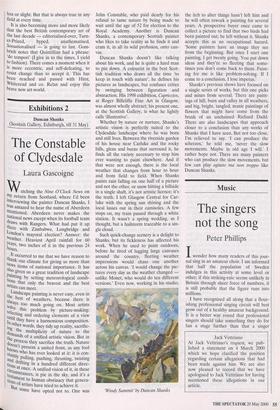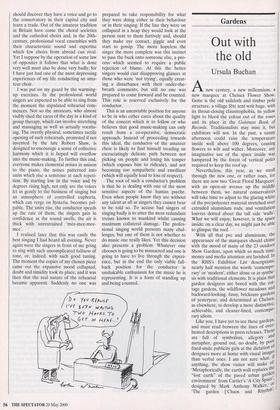Music
The singers not the song
Peter Phillips
Iwonder how many readers of this jour- nal sing in an amateur choir. I am informed that half the population of Sweden indulges in this activity at some level or other; if this striking-rate seems unlikely in Britain through sheer force of numbers, it is still probable that the figure runs into millions.
I have recognised all along that a flour- ishing professional singing circuit will best grow out of a healthy amateur background. It is a better way round that professional singers should take something they do for fun a stage further than that a singer should discover they have a voice and go to the conservatory in their capital city and learn a trade. Out of the amateur tradition in Britain have come the choral societies and the cathedral choirs and, in the 20th- century, professional vocal ensembles with their characteristic sound and expertise which few choirs from abroad can rival. Yet I suppose by the operation of some law of opposites it follows that what is done very well must also be done very badly, for I have just had one of the most depressing experiences of my life conducting an ama- teur choir.
I was put on my guard by the warming- up exercises. In the professional world singers are expected to be able to sing from the moment the stipulated rehearsal com- mences. Not so the amateurs, who almost visibly shed the cares of the day in a kind of group therapy, which can involve stretching and massaging as well as actually vocalis- ing. The overtly physical, sometimes tactile opening of such rehearsals, promoted if not invented by the late Robert Shaw, is designed to encourage a sense of collective harmony which it is hoped will overflow into the music-making. To further this end, everyone makes elemental noises in unison to the piano, the noises patterned into units which rise a semitone at each repeti- tion. By starting low in the voice and by degrees rising high, not only are the voices let in gently to the business of singing but an atmosphere of controlled euphoria, which can verge on hysteria, becomes pal- pable. The units rise, the conductor speeds up the rate of them, the singers gain in confidence as the sound swells, the air is thick with unrestrained `mee-mee-mee- mee'.
I realised later that this was easily the best singing I had heard all evening. Never again were the singers in front of me going to sing with such uncomplicated fullness of tone, or, indeed, with such good tuning. The moment the copies of my chosen piece came out the expansive mood collapsed, doubt and timidity took its place, and it was then that the real nature of the rehearsal became apparent. Suddenly no one was
..... ....... prepared to take responsibility for what they were doing either in their behaviour or in their singing. If the line they were on collapsed in a heap they would look at the person next to them furtively and, should they make eye contact, giggle and even start to gossip. The more hopeless the singer the more complete was this instinct to pass the buck onto someone else, a pro- cess which seemed to require a public rejection of blame. At this the better- singers would cast disapproving glances at those who were 'not trying', equally creat- ing a disturbance with their under-the- breath comments, but still no one was prepared to come forward and be counted. This role is reserved exclusively for the conductor. .
This is an unenviable position for anyone to be in who either cares about the quality of the concert which is to follow or who believes that good music-making can only result from a co-operative, democratic approach. Instead of proceeding towards this ideal, the conductor of the amateur choir is likely to find himself treading an excruciatingly delicate path between not picking on people and losing his temper (which exposes him to ridicule), and not becoming too sympathetic and emollient (which will equally lead to loss of respect).
The root of such a conductor's problem is that he is dealing with one of the most sensitive aspects of the human psyche. Even when people know they are without any talent at all as singers they cannot bear to be told so. To accuse bad singers of singing badly is to utter the most redundant truism known to mankind whilst causing maximum collateral damage. The profes- sional singing world presents many chal- lenges, but one of them is not whether to do music one really likes. Yet this decision also presents a problem. Whatever one chooses is going to be massacred and one is going to have to live through the experi- ence, but in the end the only viable fall- back position for the conductor is unshakable enthusiasm for the music he is representing. It is a form of standing up and being counted.










































































 Previous page
Previous page